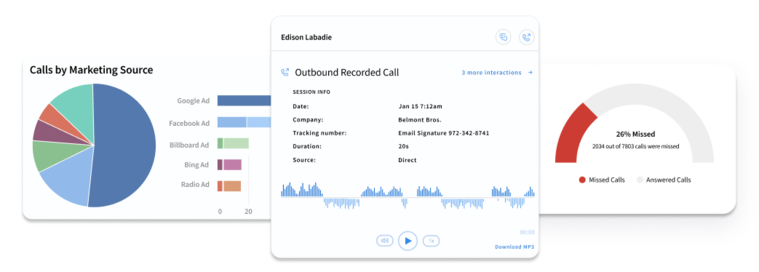In today's competitive business landscape, small businesses must leverage the power of online marketing to attract and retain customers. Implementing the right marketing tools can streamline tasks, improve efficiency, and ultimately boost the bottom line.
By harnessing technology and automation, small business owners can level the playing field with larger competitors and focus on their core competencies.
A wide range of marketing tools are available to cater to the diverse needs of small businesses, from search engine optimization (SEO) to email marketing campaigns. Using these tools strategically can help optimize online presence, increase brand awareness, and foster customer engagement.
The key for any small business is to select the most suitable tools that align with their goals, resources, and target audience.
Adopting practical marketing tools can serve as a backbone for the growth and success of small businesses. Understanding how these tools work, along with keeping an eye on new trends and advancements, is critical to maintaining a competitive edge in the market.
In the following sections, we will discuss various marketing tools and their applications explicitly tailored to the needs of small business owners.
CallRail: The Highest-Rated Call Tracking Solution for Small Businesses

CallRail is a top-rated call tracking and marketing analytics software that allows small businesses to optimize their marketing campaigns and improve their return on investment (ROI). This easy-to-use tool provides valuable insights by tracking phone calls and web forms.
Setting up CallRail for your small business is a straightforward process. Start by choosing your tracking numbers or importing existing business numbers. Then, swap in a tracking number anywhere you would place a phone number in your marketing, such as on signs, mailers, and your Google Business profile.
By doing so, you can effectively monitor your marketing efforts and improve your strategies. Incorporating CallRail into your marketing campaigns offers several advantages:
- Campaign Optimization: Understand which campaigns are driving leads and conversions. Enhance your PPC, SEO, and offline advertising to generate better results.
- Marketing Analytics: Gain deep insights into both online and offline marketing channels. Discover trends and patterns that can help improve future campaigns.
- Integration: CallRail integrates with over 50+ leading marketing tools, boosting efficiency and providing valuable data.
A vital aspect of effective marketing is setting up tracking before launching any activities. This ensures that data is collected from the start, enabling businesses to analyze performance, identify areas for improvement, and allocate resources more efficiently.
CallRail, with its easy-to-use features and comprehensive tracking capabilities, is a reliable solution for small businesses looking to optimize their marketing efforts and increase ROI.
Understanding Marketing Tools: An Overview
Marketing tools are crucial in helping small businesses expand their reach, build their brand, and drive sales. These tools come in various forms and serve different purposes. By examining their features and benefits, businesses can choose the right ones based on their needs and requirements.
One prevalent category of marketing tools for small businesses is lead capture forms, landing page builders, and pop-up tools. Using these tools, businesses can strategically place forms and pop-ups on their website to collect valuable contact information from potential customers.
This process enables marketers to build a targeted audience base and initiate follow-up communication with potential clients.
Another essential type of marketing tool is marketing automation software, such as HubSpot, Mailchimp, and Drip. These products help automate various marketing tasks, such as email marketing, social media management, and customer relationship management.
Automating these functions can save businesses significant time and resources, allowing them to focus on other critical aspects of their operations.
In addition to lead-capturing and marketing automation tools, small businesses can also utilize analytics tools to track their performance. These tools provide valuable insights into marketing campaigns' effectiveness, enabling businesses to optimize their efforts and maximize their return on investment (ROI).
Let’s dive into each of these categories one by one.
SEO Tools
When it comes to marketing for small businesses, SEO is essential for increasing visibility online. In this section, we will discuss two types of SEO tools that can help small businesses: keyword research tools and website analytics tools.
Keyword Research Tools
Keyword research tools are vital in finding the right keywords to target in your content and improving your website's search engine ranking. Some popular keyword research tools include:
- Google Keyword Planner: A free tool from Google that allows you to find keyword ideas and search volume data.
- SEMrush: A comprehensive SEO tool that provides keyword research, competitor analysis, and more.
- Ubersuggest: A user-friendly keyword research tool offering insights into keyword search volume and competition.
Using these tools, small business owners can identify the most relevant keywords for their target audience and optimize their content accordingly.
Website Analytics Tools
Website analytics tools help small businesses track and analyze their website's performance. Some widely-used website analytics tools are:
- Google Analytics: A powerful and free web analytics tool that tracks and reports website traffic, helping businesses understand how users find and interact with their site.
- Moz Pro: A comprehensive SEO software that offers analytics, keyword research, link building, and more.
- Ahrefs: A highly-regarded SEO tool featuring website analytics, backlink analysis, and keyword research capabilities.
By choosing the right combination of keyword research and website analytics tools, small businesses can effectively optimize their SEO strategy and increase their online presence. Remember to follow best practices, use concise language, and ensure a clear, knowledgeable tone throughout your content to engage readers.
Social Media Marketing Tools
Content Creation Tools
Content creation tools play a significant role in creating visually appealing and engaging content for social media platforms. These tools help users design images, graphics, and videos to catch the audience's attention. A few popular content creation tools include Canva, Adobe Spark, and Piktochart. These tools often offer pre-made templates and design elements that make it easy for small business owners to achieve a professional look with minimal effort.
Social Media Scheduling Tools
Social media scheduling tools help small businesses save time and maintain a consistent posting schedule across various platforms. By using these tools, businesses can plan and schedule content in advance, ensuring a steady flow of updates to engage their audience. Some notable social media scheduling tools are Hootsuite, Buffer, and Later.
These platforms often provide additional features such as analytics, monitoring, and collaboration options for teams to manage their social media presence effectively.
Using both content creation and social media scheduling tools, small businesses can streamline their marketing efforts and maximize engagement with their target audience. These tools offer a range of features tailored to the needs of small businesses, ensuring they can create a solid social media presence and maintain a consistent posting schedule.
Email Marketing Tools
Email Campaign Tools
Email campaign tools are essential for small businesses to create, send, and track email marketing campaigns effectively. These tools help simplify the process of designing professional emails, managing contacts, and measuring the performance of campaigns. Some popular email campaign tools for small businesses include HubSpot, Mailchimp, and Systeme.io. Each tool offers different features and pricing options, so it is essential to carefully consider the needs of your business before selecting a tool.
Customer Segmentation Tools
Customer segmentation tools enable small businesses to divide their email lists into groups based on various criteria, such as demographics, purchase history, and engagement levels. By segmenting their audience, businesses can tailor their content and messaging to suit the needs and preferences of each group, leading to higher open rates, click-through rates, and conversions.
Effective customer segmentation relies on accurate and up-to-date customer data. Some email marketing platforms, like Freshmarketer, offer built-in customer segmentation features that can handle up to 25 custom email domains. These tools provide a user-friendly interface for managing customer data, setting up different segments, and creating targeted email campaigns for each group.
In conclusion, small businesses can greatly benefit from using email marketing tools to streamline their marketing efforts and drive results. Taking advantage of email campaigns and customer segmentation tools can lead to improved customer engagement, increased conversions, and overall growth for your business. Remember, it is essential to select tools that best align with your business's needs and resources.
Content Marketing Tools
Content Management Systems
Content management systems (CMS) are essential for businesses to manage and organize digital content. A good CMS provides an easy way to create, edit, and publish content across different channels. Some popular CMS options for small businesses include WordPress, Joomla, and Drupal. Each platform offers various features and customization options tailored to your business needs. They also come with integrations for marketing, social media, and analytics tools.
Blogging Platforms
Blogging platforms can boost a small business's online presence and establish credibility in the industry. They enable companies to create valuable content for their target audience consistently. Some of the popular blogging platforms for small businesses are:
- WordPress: WordPress is a versatile CMS that doubles as a powerful blogging platform. It offers various themes and plugins to optimize content for search engines and user experience. Additionally, it allows for easy content management and distribution.
- Blogger: Google's Blogger is a simple and easy-to-use platform for small to medium-sized businesses. It has various templates and offers a built-in analytics system to understand user interactions with your content.
- Medium: Medium is a platform focused on high-quality content with a large existing audience base. It allows for easy content creation and distribution but has limited design and customization options compared to other platforms.
It's essential to carefully consider the features and strengths of each platform to choose the one that fits your small business's needs and goals. Using content marketing tools effectively can enhance brand visibility, generate leads, and, ultimately, increase revenue.
Customer Relationship Management Tools
Engagement Tools
Engagement tools are crucial for small businesses to connect with customers and interact with them effectively. These tools help businesses to manage communication channels, such as email, social media, and chatbots. Some popular engagement tools include Zoho CRM and Freshsales. With these platforms, businesses can send personalized messages, track customer interactions, and automate marketing efforts.
Chatbot services: Automating customer support via chatbots like Drift, Intercom, or Chatfuel helps businesses manage queries around the clock without a large support team.
Loyalty Program Tools
Loyalty program tools are essential for small businesses to reward their customers, increase repeat purchases, and enhance customer retention. These programs provide incentives such as discounts, exclusive offers, and redeemable points. Some popular loyalty program tools include Smile.io, Yotpo, and LoyalZoo.
- Points-based systems: Allow customers to earn points for each purchase or referral, which they can redeem later for rewards or discounts. Examples: Swell Rewards, Annex Cloud.
- Tiered membership: Offer customers exclusive benefits based on their membership level. Higher levels unlock better rewards—examples: WooCommerce Loyalty Points plugin, Perksy.
- Cashback programs: Offers cashback or discounts on specific products or categories that encourage repeat purchases. Examples: Ebates, CashbackEarners.
By integrating effective engagement and loyalty program tools, small businesses can enhance customer relationship management efforts, building stronger connections and fostering long-term client relationships.
Affiliate Marketing Tools
Affiliate marketing tools are essential for small businesses to boost their sales and increase brand awareness. These tools help track and manage affiliates, providing high-quality content to enhance audience engagement.
Managing your affiliate campaigns and tracking results is crucial to excelling at affiliate marketing. Platforms like CJ are designed for affiliate marketers to manage campaigns and track performance.
To Sum It All Up
In conclusion, using the right blend of marketing tools can significantly boost your small business's marketing efforts. By selecting tools that cater to your specific needs, you can streamline tasks, improve audience engagement, and ultimately increase your revenue and brand exposure.








